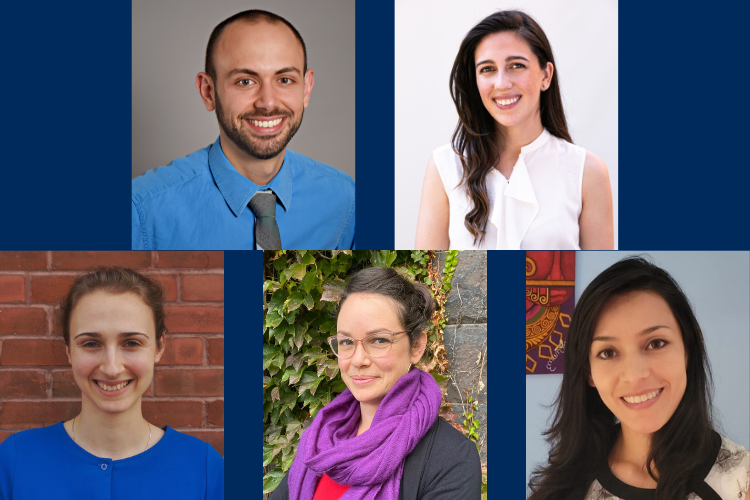These researchers explore how Latine/x newcomers experience housing and health
February 2/2024
The two-year study will explore housing and health challenges unique to Latine/x newcomers.
By Elaine Smith
Professor Amaya Perez-Brumer, an early career researcher at the Dalla Lana School of Public Health (DLSPH), and her co-researchers have been awarded a Connaught Community Partnership Grant to study the unique housing challenges facing Spanish-speaking newcomers from Latin America to Canada and how these challenges impact their health.

Co-researchers pictured: Michael Widener, Marianne Lahaie Luna, Dorothy Apedaile, Amaya Perez-Brumer and Mariangela Castro Arteaga. Not pictured: Duberlis Ramos, Carmen Cruz, David Morales-Naudon.
Donde Vivimos (translated from Spanish to English as Where We Live) is a two-year mixed methods study with a horizontal leadership structure. Perez-Brumer and Professor Michael Widener, cross-appointed with the Department of Geography and Planning, will conduct the study in partnership with the Hispanic Development Council and U of T Latine/x students. Their research will assess housing (in)stability among adult Spanish speaking newcomers from Latin America and its relationship with self-rated health and access to medical care.
Connaught Community Partnership Grants are designed to support new or early-stage partnerships between U of T and community partners. Specifically, those that share an interest in evolving into more established relationships; ones that are built to share knowledge and expertise and that can attract external funding over time.
“The Connaught Community Partnership Grant provided our team with a unique opportunity to support a new partnership between U of T (DLPSH, Geography and Planning) and the Hispanic Development Council by extending the impact of a recently awarded one-year School of City Urban Challenge grant,” says Perez-Brumer.
The findings will help advocates, such as the Hispanic Development Council, better understand the needs of Spanish-speaking newcomers from Latin America and what can be done to improve services. The formative results from this study will be used as the basis to apply for a Canadian Government’s Social Sciences and Humanities Research Council Partnership Development Grant focused on migration in the Americas.
“Through Donde Vivimos, we aim to support ongoing advocacy, policy discourse, and urban planning strategies focused on the key role of housing as a determinant of health for Spanish speaking migrants to Canada from Latin America, and to amplify the required societal response for all newcomers,” says Widener.